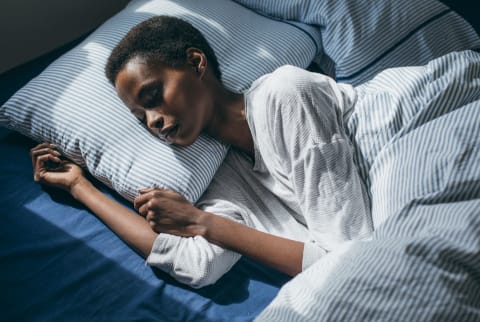
Our editors have independently chosen the products listed on this page. If you purchase something mentioned in this article, we may earn a small commission.
September 26, 2021 — 9:31 AM
By the CDC’s estimation, more than a third of American adults aren’t getting the recommended seven hours of sleep a night. As the number of tired people surges, the sleep supplement market also expands with new options. And you’ve likely heard from at least one person (or perhaps, you are the person) who has tried “every single one of them” to no avail, still plagued by restless nights.
This could be happening for one of two reasons: Either that person has a major sleep disorder that should be attended to by a specialized health care practitioner, or they have bad sleep habits that are keeping the supplements from doing their job. Because while these remedies can be effective, they can’t undo poor sleep hygiene.
Here, a sleep specialist troubleshoots both concerns and shares how to work with and not against your supplement so that better sleep can follow.
Reason 1: You expect it to treat a major sleep disorder.
It’s all in the name: Supplements are supplementary. They can help support healthy function in the body, but they can’t treat full-on diseases or disorders.
“If it’s not medicine, it’s not designed to fix a major problem,” Michael Grandner, Ph.D., director of the Sleep and Health Research Program at the University of Arizona, tells mbg. “Supplements might support healthy sleep, and they might alleviate minor problems, but if you’ve got a sleep disorder—including insomnia—that’s not what they’re designed for.”
sleep support+
The deep and restorative sleep you’ve always dreamt about*

He likens taking a sleep supplement for chronic insomnia to expecting teeth brushing to fix your overbite: You can brush all you want—and you’ll be better off for it—but at the end of the day, you’ll need to get those braces if you want to correct the overbite.
This is an important distinction because when people start a new supplement with unrealistic expectations, they’re bound to find them ineffective. If you consistently struggle to fall or stay asleep, to the point that it affects your quality of life, you’ll want to visit a doctor or sleep specialist instead of trying supplement after supplement.
However, if you don’t have a sleep disorder but suspect that you could be sleeping deeper and waking up more refreshed, the right supplement might be able to help.*
Reason 2: You don’t support it with the right habits.
Just like you can’t exercise your way out of an unhealthy diet, you can’t supplement your way out of bad sleep habits. Again, think of these as tools that can make your healthy habits go the distance—not course-correct your unhealthy ones. Here, Grandner shares the top three things you can do to help your sleep supplement work as intended:*
- Leave the bed for sleeping: When we train the body to associate the bed with sleep, we get tired as soon as we get under the covers. It’s that simple. “Don’t dilute the power of the bed. Make it just for sleep—so that when you get in there, your brain thinks, ‘Ah, this is the sleeping place,'” Grandner says. This means getting out of bed when your alarm goes off in the morning, resisting the urge to lie down throughout the day, and getting up and doing something else for a few minutes if you wake up mid-sleep.
- Reserve some time to wind down: Taking a sleep supplement should be one part of a larger nighttime routine*—not just something you do right before bed in the hopes of having it knock you out right away. Our bodies can’t turn off and on on-demand, after all, and they need some time to get into sleep mode. Be strict with yourself and set a time every night that you’ll send that last email, shut off your devices, take your supplement, and start to do calming activities.* (Setting alarms can help here too.)
- Nix the no-no’s: Even the most effective supplement can’t give you a night of perfect sleep after a day of chugging coffee or booze. “Supplements can be great for facilitating the sleep process, but you also want to remove barriers [to sleep],” says Grandner. He stresses the importance of limiting caffeine in the afternoon and evening, avoiding alcohol right before bed and staying away from other sleep-disrupting vices like nicotine.
When starting any new sleep supplement, you should always follow the manufacturer’s directions to ensure that you’re using it properly. But no matter what it is you’re taking, these general best practices will probably help you get the most out of it.
If you are pregnant, breastfeeding, or taking medications, consult with your doctor before starting a supplement routine. It is always optimal to consult with a health care provider when considering what supplements are right for you.

sleep support+
The deep and restorative sleep you’ve always dreamt about*
sleep support+
The deep and restorative sleep you’ve always dreamt about*

https://www.mindbodygreen.com/articles/do-sleep-supplements-work








